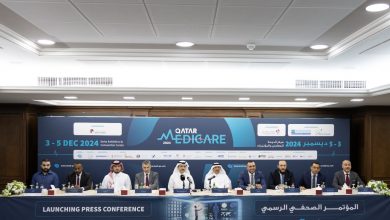WHO Designates HMC Department of Geriatrics and Long-Term Care as Collaborating Center
منظمة الصحة العالمية تختار قسم أمراض الشيخوخة والرعاية المطولة بمؤسسة حمد الطبية كمركز متعاون
QNA
Doha: Hamad Medical Corporation’s (HMC) Department of Geriatrics and Long-Term Care has been designated by the World Health Organization (WHO) as a WHO Collaborating Center for Healthy Ageing and Dementia. The Collaborating Center initiative is designed to bring benefits to both parties, including more visibility of key projects and programs, enabling improved opportunities to exchange information and develop technical cooperation with other international institutions as well as facilitate better access to funding for research and program development.
Dr. Hanadi Al Hamad, National Lead for Healthy Ageing in Qatar and Chairperson of the Department of Geriatrics and Long-Term Care at HMC, was designated as the Head of the Collaborating Center.
WHO Collaborating Centers are institutions which are designated by the Director-General to carry out activities in support of the Organization’s programs. Currently there are over 800 WHO Collaborating Centers in over 80 Member States working with WHO on areas such as nursing, occupational health, communicable diseases, nutrition, mental health, chronic diseases and health technologies.
HE Minister of Public Health Dr. Hanan Mohamed Al Kuwari praised this unique cooperation between the State of Qatar represented by the Ministry of Public Health and the World Health Organization, which is the third Collaborating Center, which confirms the strong focus and commitment to local health care.
Previous Collaborating Center agreements in Qatar include the WHO Collaborating Center for Disease Epidemiology Analytics on HIV/AIDS, Sexually Transmitted Infections, and Viral Hepatitis with Weill Cornell Medicine-Qatar, and the WHO Collaborating Center for Treating Tobacco Dependence with the HMC’s Tobacco Control Center, which achieved re-designation in 2021.
Dr. Al Hamad said: “Qatar’s population is growing exponentially, and this is resulting in a rapidly growing number of older adults. While some people age well and remain active and relatively illness free in older age, others are more prone to chronic diseases and disabilities that negatively impact their quality and length of life. This Collaboration Center will support the WHO by contributing to knowledge and research on healthy ageing, including the importance of integrated care and preventative health literacy promotion.” Dr. Al Hamad, who is also the Medical Director of Rumailah Hospital and the Qatar Rehabilitation Institute, added: “Dementia risk reduction, management and care is another important area for joint collaboration that will be greatly supported by the Collaborating Center. We are already doing a lot in terms of research and promoting integrated care for patients living with Dementia and we are happy to share our findings with the WHO and other Collaborating Centers interested in the same field.” WHO Regional Director for the Eastern Mediterranean Dr. Ahmed Al Mandhari said that this designation will help grow the collaborative efforts already in existence between relevant WHO teams and HMC teams. “WHO Collaborating Centers are a mechanism of cooperation in which relevant institutions are recognized by WHO as assisting the Organization in implementing its mandated work. These types of collaboration have been supporting the achievement of WHO’s planned strategic objectives at the regional and global levels for over 70 years. The objectives are related to the development and strengthening of national and regional institutional capacity; and enhancing the scientific validity of its global health work,” said Dr. Al Mandhari.
قنا
الدوحة: اختارت منظمة الصحة العالمية قسم أمراض الشيخوخة والرعاية المطولة التابع لمؤسسة حمد الطبية كمركز متعاون للشيخوخة الصحية وأمراض الخرف.
وتهدف المبادرة إلى تحقيق المنفعة لكلا الطرفين مثل إطلاق المشاريع والبرامج الهامة وتمكين الفرص المتطورة لتبادل المعلومات وتطوير التعاون التقني بين المؤسسات الدولية الأخرى وتسهيل الحصول على التمويل الأفضل للأبحاث وبرامج التطوير.
وقد تم تعيين الدكتورة هنادي الحمد قائد برنامج الشيخوخة الصحية في الاستراتيجية الوطنية للصحة ورئيس قسم أمراض الشيخوخة والرعاية المطولة بمؤسسة حمد الطبية لمنصب، رئيس مركز التعاون.
تعتبر مراكز التعاون التابعة لمنظمة الصحة العالمية مؤسسات يتم تعيينها من قبل المدير العام للمنظمة لتنفيذ الأنشطة لدعم برامج منظمة الصحة العالمية.
ويوجد حاليا أكثر من 800 مركز تعاون مع منظمة الصحة العالمية في أكثر من 80 من الدول الأعضاء التي تعمل مع المنظمة في مجالات التمريض والصحة الوظيفية والأمراض المعدية والتغذية والصحة النفسية والأمراض المزمنة وتقنيات الصحة.
وبهذه المناسبة ، أشادت سعادة الدكتورة حنان محمد الكواري وزير الصحة العامة بهذا التعاون الفريد بين دولة قطر ممثلة بوزارة الصحة العامة ومنظمة الصحة العالمية والذي يعتبر الثالث من نوعه مما يؤكد التركيز والالتزام القويين للرعاية الصحية المحلية.
وشمل التعاون السابق لمنظمة الصحة العالمية مع دولة قطر إنشاء مركز تعاون تحاليل وبائيات مرض فيروس نقص المناعة البشرية المنقول جنسيا “الايدز” وفيروس التهاب الكبد الوبائي مع كلية طب وايل كورنيل في قطر، ومركز التعاون بين منظمة الصحة العالمية لمكافحة استهلاك التبغ مع مركز مكافحة التدخين بمؤسسة حمد الطبية والذي حصل على إعادة تعيينه كمركز تعاون في 2021.
من جانبها قالت الدكتورة هنادي الحمد المدير الطبي لمستشفى الرميلة ومركز قطر لإعادة التأهيل، إن مركز التعاون سيقدم الدعم لمنظمة الصحة العالمية من خلال المساهمة في المعارف والأبحاث المتعلقة بالشيخوخة الصحية كأهمية الرعاية الشاملة والترويج للتثقيف الصحي والوقاية.
وأضافت أن الحد من خطر الخرف والرعاية والعلاج هو جانب آخر هام للتعاون المشترك الذي سيكون مدعوما بشكل كبير من قبل مركز التعاون، مشيرة الى العمل الجاري حاليا بشكل كبير في مجال الأبحاث والترويج للرعاية الشاملة للمرضى المصابين بالخرف، حيث يتم مشاركة النتائج مع منظمة الصحة العالمية ومراكز التعاون الأخرى التي تهتم بهذا المجال.
وبدوره، قال الدكتور أحمد المنظري المدير الإقليمي لمنظمة الصحة العالمية لشرق المتوسط، إن هذا التعيين سيساعد في تنمية جهود التعاون القائمة بين فرق منظمة الصحة العالمية ذات الصلة وفرق مؤسسة حمد الطبية.
وأضاف أن هذا التعاون يعتبر داعما لإنجازات الأهداف الاستراتيجية التي تخططها منظمة الصحة العالمية على المستوى الإقليمي والدولي منذ ما يزيد على 70 عاما وتتعلق الأهداف بتطوير وتعزيز القدرات المؤسسية الوطنية والإقليمية، وتعزيز الشرعية العلمية لعملها الصحي العالمي.




